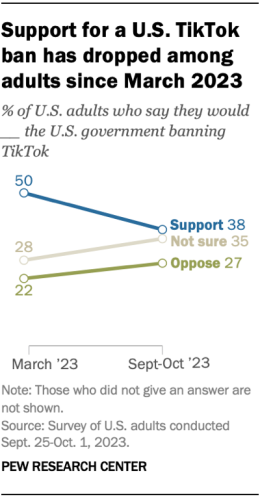☀️ Happy Thursday! The Briefing is your guide to the world of news and information. Sign up here!
In today’s email:
- Top story: Elon Musk restores Alex Jones’ X account
- New from Pew Research Center: A look at how teens use social media and the internet
- In other news: Many commentators and voters use TikTok, but most politicians don’t
- Looking ahead: A CBS journalist faces contempt of court charges if she does not reveal a source
- Chart of the week: Support for a TikTok ban has declined since March
🔥 Top story
Elon Musk has restored conspiracy theorist Alex Jones’ account on X, formerly known as Twitter, following a poll asking users if Jones’ account should be reinstated. Jones and his InfoWars outlet were “permanently suspended” from Twitter in 2018 due to tweets and videos that violated the platform’s abusive behavior policy.
Musk’s move comes amid significant partisan shifts among news consumers on the platform. In 2022, before Musk purchased Twitter, 65% of Americans who said they regularly got news on the site were Democrats or independents who leaned Democratic. This year, news consumers on X are about evenly split between Democrats and Republicans (49% vs. 46%).
According to a 2023 Center survey, Democratic users were far more likely than Republican users to say inaccurate or misleading information (68% vs. 37%), and the tone or civility of discussions (50% vs. 27%) were major problems on the platform. In a different 2023 survey, 65% of U.S. adults said that tech companies should take steps to restrict false information online even if it limits freedom of information.
🚨 New from Pew Research Center
A new Pew Research Center survey of U.S. teens focused on social media, internet use and device ownership among teens.
Here’s a look at some key findings:
- YouTube continues to dominate. Roughly nine-in-ten teens say they use YouTube, making it the most widely used platform measured in our survey.
- TikTok, Snapchat and Instagram remain popular among teens: Majorities of teens ages 13 to 17 say they use TikTok (63%), Snapchat (60%) and Instagram (59%). For older teens ages 15 to 17, these shares are about seven-in-ten.
- Teens are less likely to be using Facebook and Twitter (recently renamed X) than they were a decade ago: Facebook once dominated the social media landscape among America’s youth, but the share of teens who use the site has dropped from 71% in 2014-15 to 33% today. Twitter has also seen its teen user base shrink during the past decade – albeit at a less steep decline than Facebook.
Also: Where teens and adults stand on banning TikTok
📌 In other news
- While many political influencers and voters use TikTok, few political candidates for the 2024 election use the app
- Tucker Carlson launches a subscription streaming service
- OpenAI and Axel Springer make a deal to offer news in ChatGPT
- New projections suggest U.S. political ad spending could surge to $16 billion in 2024
- Media Matters sues Texas attorney general over investigation into the outlet’s reporting about the X app
- The impact of citizen journalists in Gaza
📅 Looking ahead
A CBS reporter could soon be held in contempt of court if she does not reveal the source she used for a series of investigative stories she wrote at Fox News in 2017. While working there, Catherine Herridge reported on a federal probe into a Chinese American scientist, using an unnamed source. A U.S. District Court in August ruled she must reveal her source, a ruling that press advocates say is a violation of the First Amendment and will have a chilling effect on journalism.
According to a 2020 Pew Research Center study on the use of unnamed sources, a majority of U.S. adults (82%) say that there are times when it is acceptable for journalists to use anonymous sources, with 67% saying it is acceptable only in special cases.
📊 Chart of the week
This week’s chart comes from our new blog post exploring views of a TikTok ban.
The share of Americans who say they would support the U.S. government banning TikTok has declined from 50% in March to 38% in the new survey, conducted in late September and early October. The percentages who say they are opposed to a potential ban or uncertain about it have both increased.

👋 That’s all for this week.
The Briefing is compiled by Pew Research Center staff, including Naomi Forman-Katz, Jacob Liedke, Sarah Naseer, Christopher St. Aubin, Luxuan Wang and Emily Tomasik. It is edited by Katerina Eva Matsa, Michael Lipka and Mark Jurkowitz, and copy edited by David Kent.
Do you like this newsletter? Email us at journalism@pewresearch.org or fill out this two-question survey to tell us what you think.